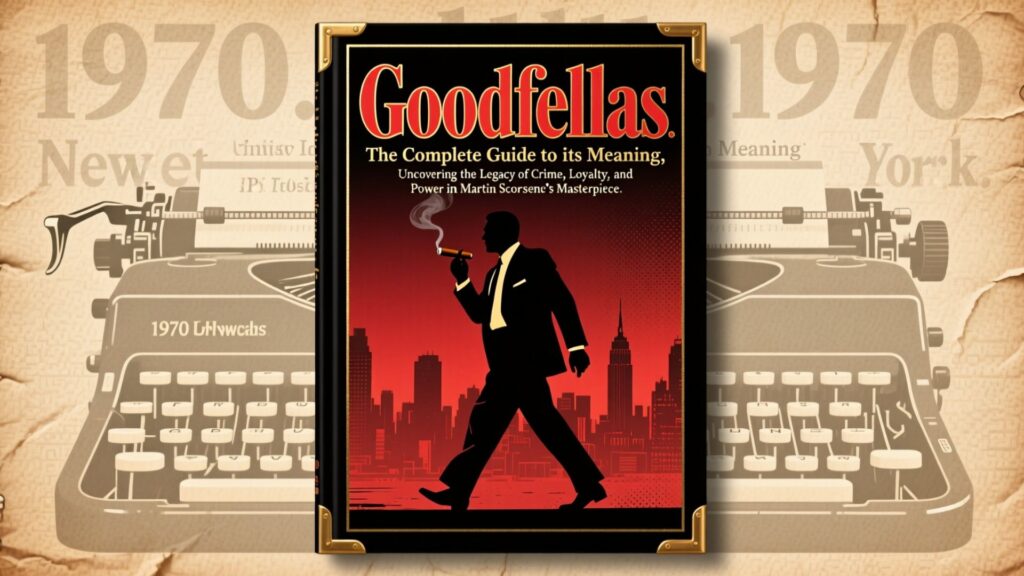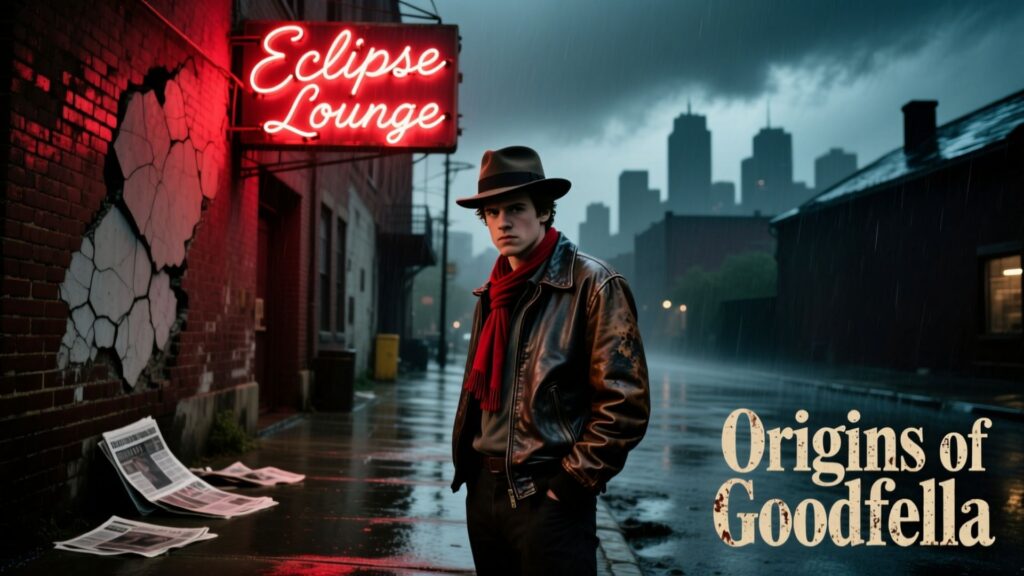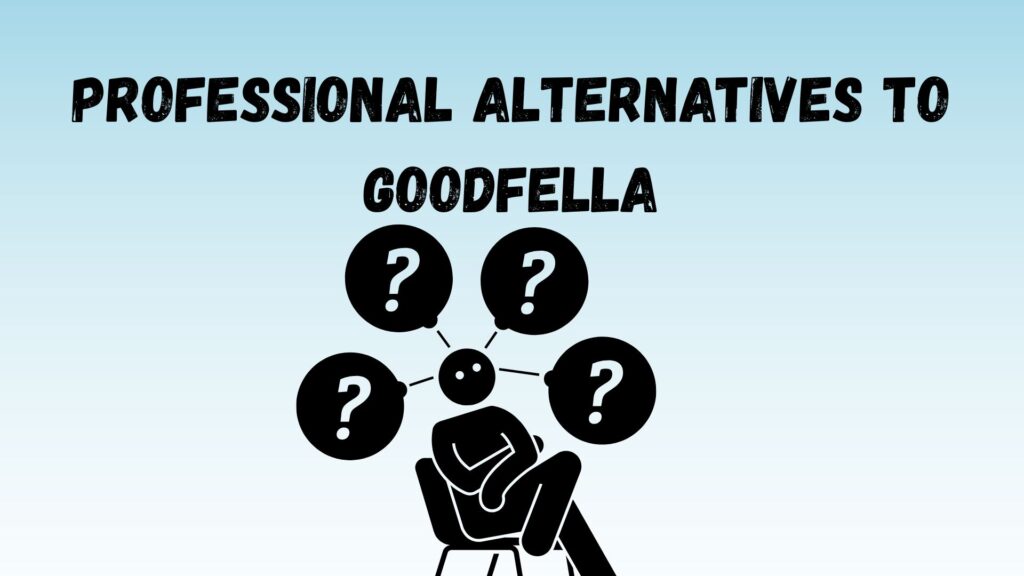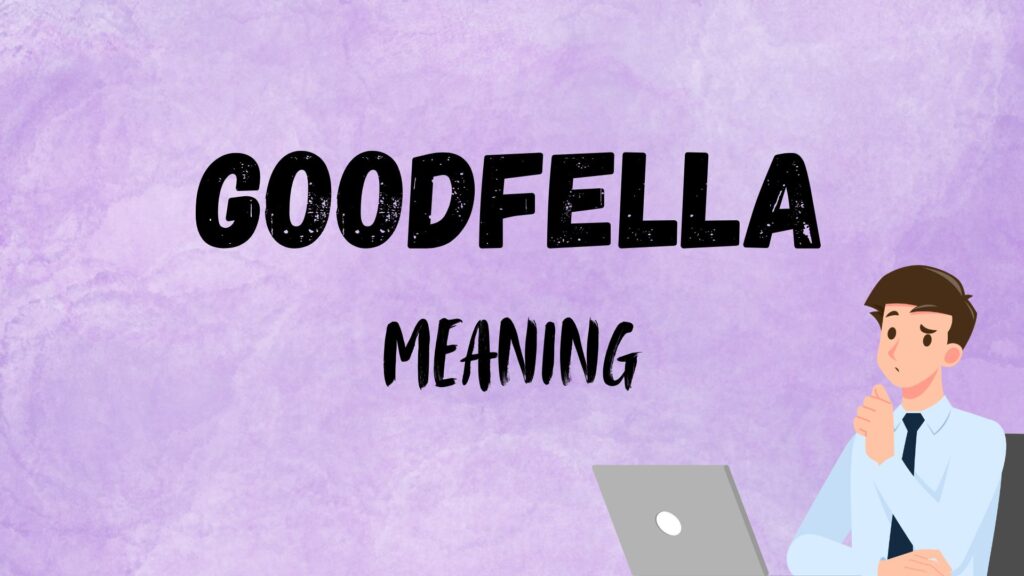Language has a way of reshaping itself over time. Certain words start in one corner of culture, then branch out into film, music, and everyday talk. One word that carries this weight is “Goodfella.” From Italian-American neighborhoods to Hollywood cinema, it has crossed generations and contexts. If you’ve ever wondered about the real Goodfella meaning and how it compares with Goodfellas meaning, this guide breaks it down from every angle.
What Does Goodfella Mean?

At its core, “Goodfella” is slang for a man who belongs to the Mafia or organized crime. It’s derived from Italian-American street culture, where mobsters referred to themselves as “good fellows” rather than gangsters.
But the term isn’t limited to crime. In informal contexts, “Goodfella” can also mean:
- A trustworthy friend
- A loyal companion
- Someone who looks out for others
- A person with charm or street smarts
Think of it as a word with layers of meaning. In one situation, it’s deadly serious. In another, it’s playful and friendly.
Origins of Goodfella

The roots of “Goodfella” trace back to two sources:
- Linguistic Roots
- It stems from the word “Goodfellow” a phrase used for centuries in English to describe a kind or pleasant person. Over time, especially in Italian-American communities, it shortened to “Goodfella.”
- Mafia Connection
- Within organized crime circles, a “Goodfella” is an initiated member of the Mafia. It represents loyalty, trustworthiness, and silence under the code of Omertà.
- Cultural Spread
- The word took center stage with Martin Scorsese’s 1990 film Goodfellas, which immortalized the life of mob associate Henry Hill. After that, the term entered mainstream vocabulary.
Goodfella in Pop Culture
The impact of “Goodfella” on pop culture can’t be overstated. The 1990 film Goodfellas didn’t just entertain it defined how millions understood the Mafia world.
The Film That Made It Famous
- Goodfellas starred Ray Liotta, Robert De Niro, and Joe Pesci.
- It won critical acclaim and became a cornerstone of crime cinema.
- The title itself made the slang word “Goodfella” globally recognizable.
In Music and Street Culture
- Hip-hop lyrics often reference “Goodfellas” to symbolize loyalty, power, and brotherhood.
- Artists like Nas, Jay-Z, and The Notorious B.I.G. have used the term.
On Television
- Shows such as The Sopranos borrow heavily from the imagery of Goodfellas.
- Several actors even crossed over between the film and the series.
The word has become a cultural shorthand. When you hear “Goodfella,” you think mobster, loyalty, and old-school respect.
Goodfella in Modern Language
Outside of movies and crime stories, the word has softened in daily life. People sometimes call a close friend a “Goodfella” as a term of endearment.
Here are examples of modern contexts:
- Friendly use: “He’s a real goodfella, always helping everyone out.”
- Street slang: “You stick with your goodfellas, they got your back.”
- Casual talk: “Met a goodfella at work, cool guy.”
This shift shows how a word once tied to the underworld now has broader appeal.
Goodfella in Digital Communication
Language online often takes on new shades of meaning. On social media and in texts, Goodfella meaning can change depending on tone.
In Text Messages
- “That’s my goodfella!” → affectionate, friendly
- “Watch out for that goodfella” → slightly suspicious
On Social Media
- Used as a hashtag with #loyalty, #friendship, or #mafiaaesthetic
- Seen in memes referencing Goodfellas movie quotes
Generational Differences
- Older generations: associate it with the Mafia or the movie
- Younger generations: use it more loosely, like “bro” or “homie”
Polite Alternatives to Goodfella
When you need a word that sounds respectful rather than slangy, these fit better:
- Gentleman
- Companion
- Ally
- Friend
Example:
Instead of saying, “He’s a goodfella in the office,” you’d say, “He’s a dependable colleague.”
Professional Alternatives to Goodfella

Business settings demand professionalism. Try these instead:
- Colleague
- Partner
- Associate
- Teammate
Example:
Rather than, “That goodfella closed the deal,” say, “That associate handled the negotiation well.”
Casual Alternatives to Goodfella
For friendly, informal conversations, you’ve got plenty of choices:
- Bro
- Dude
- Mate
- Homie
- Pal
Example:
“That’s my dude, always got my back.”
How to Choose the Right Alternative
Choosing the right word depends on:
- Tone: Is it lighthearted or serious?
- Relationship: Are you speaking to a boss, a friend, or a stranger?
- Setting: Is it workplace, street talk, or online?
| Context | Better Choice |
|---|---|
| Workplace | Associate, Colleague |
| Casual hangout | Bro, Dude, Mate |
| Respectful setting | Gentleman, Friend |
| Online/Slang | Goodfella, Homie |
15+ Examples of “Goodfella” and Its Alternatives
- “He’s my goodfella from back in school.”
- “Only goodfellas stick around when times get tough.”
- “Every gentleman in that group showed respect.”
- “My colleague helped me finish the report on time.”
- “That dude is hilarious.”
- “Met a new mate on the soccer team.”
- “My partner in business knows his craft.”
- “Pal, don’t worry you’re covered.”
- “Homie, let’s roll.”
- “The associate handled the case perfectly.”
- “Gentleman, may I introduce my friend?”
- “My bro always comes through.”
- “That ally never breaks trust.”
- “A real companion doesn’t walk away.”
- “He’s a goodfella loyal to the core.”
Nuances of Tone When Using Goodfella
The tone of “Goodfella” changes meaning:
- Friendly tone: warmth, closeness, brotherhood
- Intimidating tone: linked to Mafia or tough-guy persona
- Cultural tone: in Italian-American communities, carries deeper resonance
Example:
- Friendly: “Thanks, you’re a real goodfella.”
- Intimidating: “He’s a goodfella, don’t cross him.”
Common Misuses of Goodfella
Mistakes often happen because of confusion between Goodfella meaning and Goodfellas meaning.
- Mix-up with the movie title → People sometimes call someone “a Goodfellas” instead of “a Goodfella.”
- Wrong setting → Using “Goodfella” in a formal job interview sounds unprofessional.
- Over-romanticizing Mafia culture → Not everyone appreciates being compared to mobsters.
FAQs About Goodfella
Is “Goodfella” slang or formal?
It’s slang, never formal.
Is it always linked to the Mafia?
Not always, but the Mafia link is the most famous.
Can women be called Goodfellas?
Traditionally no it’s male-oriented. But informally, some use it for loyal women in friend groups.
What’s the difference between Goodfella and Goodfellas?
- Goodfella meaning: a single mobster or loyal companion.
- Goodfellas meaning: plural form, made famous by the 1990 movie title.
Conclusion
The term Goodfella carries history, culture, and personality. Its roots lie in Mafia traditions, but its meaning has stretched into movies, music, and casual slang. Whether you’re exploring the Goodfella meaning for its criminal roots or using it casually to mean a loyal friend, context is everything.
When you want to sound respectful, choose polite or professional alternatives. If you’re with friends, casual alternatives keep the tone natural. And remember: language evolves. What started as underworld slang now lives on in memes, texts, and conversations across the globe.
Being a Goodfella today doesn’t mean you’re part of the mob it can simply mean you’re the type of person people can count on.
Bugti is the founder of Quoethint.com, a hub for English language tips, writing advice, and grammar guidance. With years of experience in English studies and a passion for clear communication, Bugti created this platform to make grammar and writing easy to understand for everyone.
